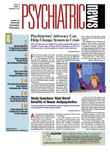The House of Representatives passed APA-supported legislation last month to expand services and research that target postpartum depression.
The Melanie Blocker-Stokes Postpartum Depression and Care Act (HR 20) would promote research and treatment for appropriate care of women with postpartum depression and postpartum psychosis through grants from the National Institutes of Health (NIH).
The bill, sponsored by Rep. Bobby Rush (D-Ill.), passed 382-3.
“The causes of postpartum depression are complex and unknown at this time,” said Rep. Frank Pallone Jr. (D-N.J.) during a May congressional hearing on the bill. “However, if diagnosed properly and treated with social support, therapy, and medication, relief is highly attainable.”
The measure also aims to improve the dissemination of guidelines for diagnosing and treating postpartum depression and related disorders to“ health care professionals and the public.”
Postpartum mood and anxiety disorders affect up to 18 percent of new mothers, and postpartum psychosis strikes 1 in 1,000 new mothers, according to the Centers for Disease Control and Prevention and other researchers.
The legislation is designed to address the range of postpartum mental health problems, which include the relatively mild “maternity blues” or “baby blues” to “devastating” postpartum psychosis. Between these two extremes is postpartum depression, the bill notes, which complicates 10 percent to 15 percent of all births and 26 percent to 32 percent of births by adolescents.
The legislation would authorize $3 million in research grants in the first year and unspecified sums thereafter. The Congressional Budget Office estimates that $18 million in grants would be awarded between 2008 and 2012.
The bill would support research such as epidemiological studies, the development of improved diagnostic techniques, clinical research, and information and education programs.
Although research suggests that many factors may contribute to the onset of postpartum depression, including hormonal changes, situational risks, and life stresses, more study is needed to clarify the condition's etiology, according to the bill's authors.
Stotland Testifies on Bill
“The bill lays out a straightforward agenda for research, resource coordination, and improved services to improve the diagnosis and treatment of postpartum depression, and—most importantly—to fund programs to establish and operate programs and systems of care for treating postpartum depression and postpartum psychosis,” said Nada Stotland, M.D., APA president-elect, in testimony on the bill in May.
Stotland stressed that the type of clinical depression that may occur after childbirth can be an agonizing and disabling disorder impacting the general and mental health of the mother as well as the entire family.
The legislation also aims to increase detection of postpartum depression by improving clinicians' training and awareness of signs and symptoms and encouraging more women to seek treatment, rather than avoid it because of social stigma or embarrassment.
The bill urges a new national awareness campaign, in addition to NIH's current efforts, to inform the public about emerging research from the field. Both the NIH and the Health Resources and Services Administration sponsor Web sites on postpartum depression.
Treatment Programs Also Supported
In addition, the bill would establish a funding mechanism for establishing and operating systems of care for treating patients with postpartum depression and postpartum psychosis through grants to public and nonprofit programs that provide health care and support services. These programs would provide postpartum mental health care through inpatient and outpatient treatment, screenings, and case-management services.
The legislation also includes language that calls for a study on abortion- and miscarriage-related depression, which was added as a compromise amendment to satisfy some Republican lawmakers who raised the issue during a hearing on the bill.
The Senate companion bill (S 1375), which does not include the abortion provision, has not yet begun to advance.
The text of the Melanie Blocker-Stokes Postpartum Depression and Care Act can be accessed at<http://thomas.loc.gov> by searching on the bill number, HR 20. ▪
